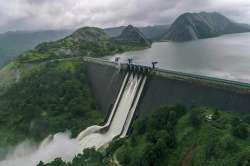Pakistan asks India to share data of water inflow and discharge at Kishanganga dam
During the 115th meeting of the Permanent Commission for Indus Waters, India had agreed to allow Pakistan to inspect the projects built on the Jhelum basin, including Kishanganga hydroelectric project.

Pakistan has asked India to immediately share the data showing inflow and discharge of water at the Kishanganga dam in Jammu and Kashmir and sought a date for its inspection, according to a media report.
During the 115th meeting of the Permanent Commission for Indus Waters, India had agreed to allow Pakistan to inspect the projects built on the Jhelum basin, including Kishanganga hydroelectric project. Islamabad had also agreed to allow New Delhi to carry out inspection of the Kotri barrage over the Indus River.
"We recently asked Indian authorities for Indus waters in writing to give us dates for inspection of the Kishanganga dam as soon as possible. Through the letter, we have also pressed Indian authorities to immediately share the data concerning flows of water at the river and releases/discharges, in/outflows at the dam with us under the relevant provisions of the Indus Water Treaty," says Pakistan's Commissioner for Indus Waters Syed Muhammad Mehr Ali Shah.
"We are receiving water at Jhelum basin in our territory, but to ascertain our need or requirement we need data India is obligated to share with us time to time," he said.
Besides Kishanganga, India had also agreed to let Pakistani experts inspect sites of two hydropower projects, 1,000MW Pakal Dul and 48MW Lower Kalnal at Chenab basin, by the end of September.
According to the report, Indian authorities had confirmed October 7 to 11 as dates for inspection of the projects by a three-member Pakistani team, headed by the Indus water commissioner. But finally it postponed the inspection on the pretext of local elections in held Kashmir.
Shah said that Pakistani authorities wanted to have a detailed tour of the Kishanganga project since Pakistan had already raised various objections on its design and construction.
Pakistan has already approached the World Bank, demanding constitution of a seven-member court of arbitration to address its concerns. On the other hand, India wants a neutral expert over the issue.
However in June this year, the World Bank reportedly requested Pakistan to stand down from pursuing its stand of referring to the Kishanganga dam dispute to the court of arbitration and instead accept India’s offer of appointing a neutral expert, but Pakistan didn’t do so and stuck to its stance to date.
He said that Pakistan had also written a letter to Indian authorities to give dates for inspection of Pakal Dul and Lower Kalnal projects at Chenab basin.